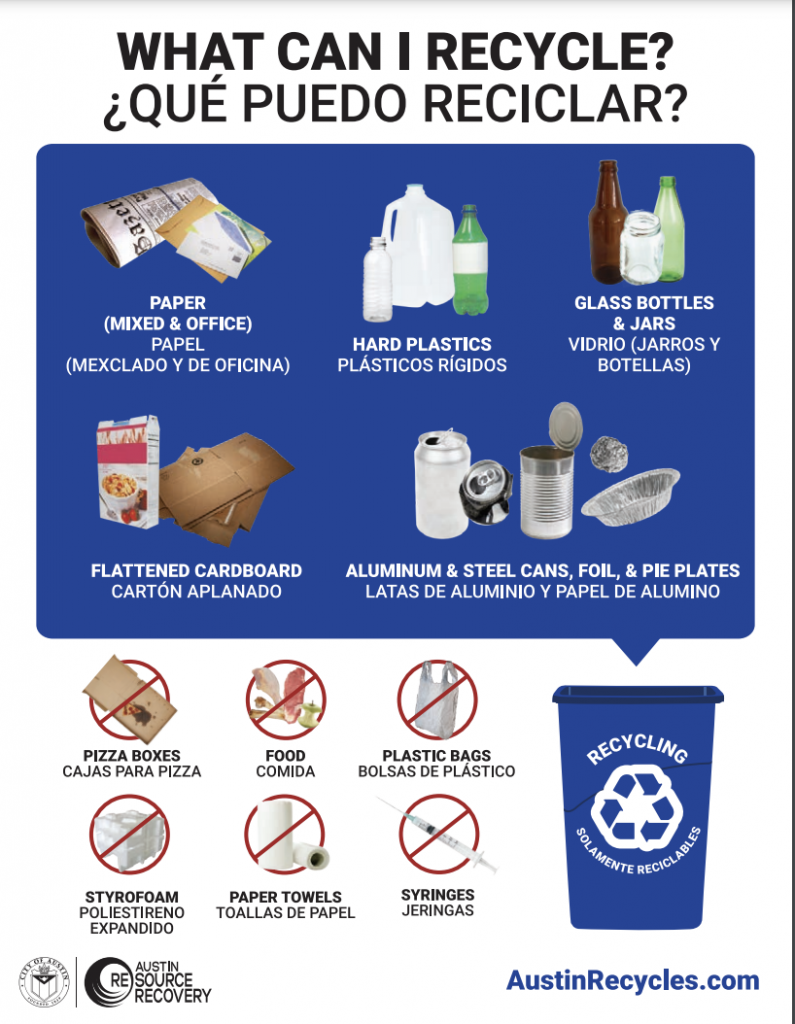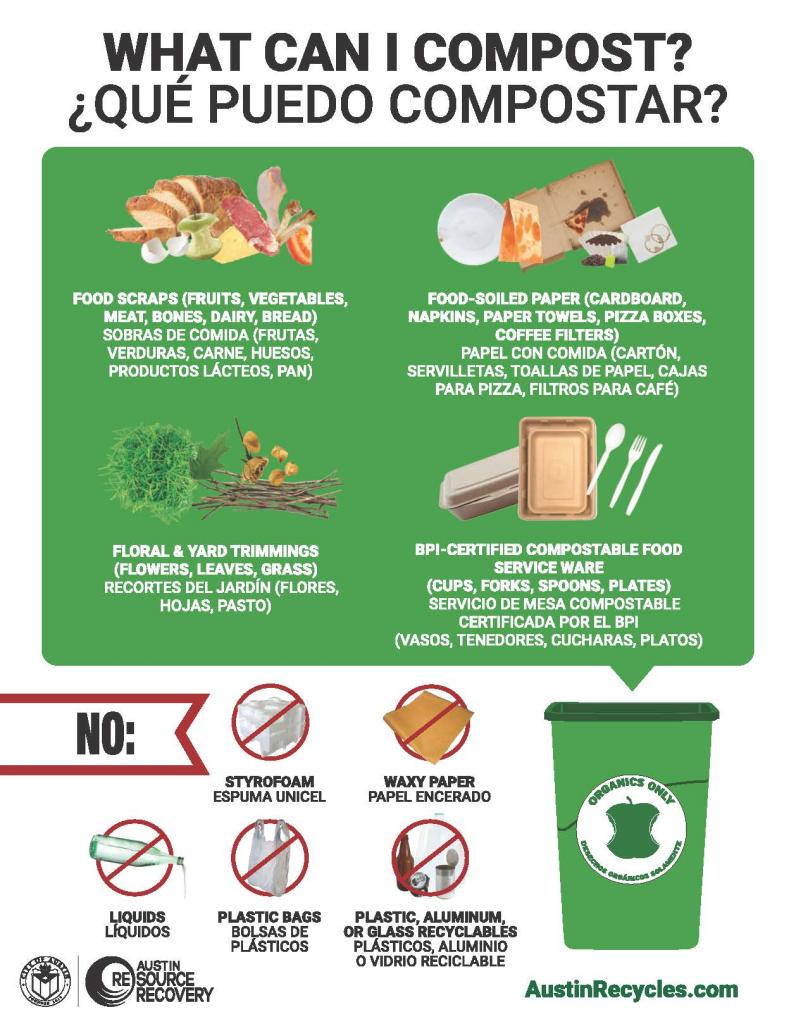The City of Austin requires multifamily property owners and managers with five or more units to ensure their residents and employees have convenient access to both recycling and composting collection services. Multifamily properties include apartments, condominiums, dormitories, assisted living facilities and nursing homes. These requirements support Austin’s goal of reaching zero waste by 2040.
Multifamily properties are required to provide their residents with convenient access to composting collection, starting Oct. 1, 2024. Learn more about multifamily composting.
Who is responsible?
Multifamily property owners and managers are responsible for meeting the city’s recycling and composting requirements. Typically, the person who oversees the contract for landfill trash, recycling and composting submits the recycling plan.
What do I need to do?
1. Submit a recycling plan
You must submit a recycling plan every year between October 1 and February 1. This plan is a report of how your property meets all of the recycling and composting requirements. You will need these items to fill out your recycling plan:
- An invoice or contract receipt from your licensed hauler(s) with:
- The size, number and location of your outdoor landfill trash, recycling and composting dumpsters or carts.
- How often your landfill, recycling and composting dumpsters or carts are picked up.
- The size, number and location of your outdoor landfill trash, recycling and composting dumpsters or carts.
- Your correct property ID, from your previous records or a letter/email from Austin Resource Recovery.
- Information about how and when you educate your residents and employees on your recycling and composting programs.
- Location of indoor and outdoor recycling and composting containers and signs at your property.
2. Offer recycling collection
Multifamily properties are required to provide sufficient recycling capacity to their residents and employees. You must:
- Provide single-stream recycling, which allows these five materials to be put into one container: paper, cardboard, metal, glass and hard plastics.
- Provide equal capacity for recycling and landfill trash; or provide 24 gallons of recycling capacity, per unit, per week.
- Consider using the capacity calculator to determine if you meet the requirement.
- Preventing landfill trash by reusing, repurposing or donating items could also help you meet this requirement.
- Consider using the capacity calculator to determine if you meet the requirement.
- Provide enough recycling capacity to avoid overflow at convenient locations for residents and employees.
3. Offer composting collection
Starting Oct. 1, 2024, multifamily properties are required to provide convenient access to commercial composting services for their residents and employees, where compostables are collected at the property by a licensed hauler and processed at a composting facility. You must:
- Accept certain materials for composting including food scraps, food-soiled paper and BPI-certified compostable products.
- Offer one gallon of composting capacity per unit. (Properties can use large, shared containers to meet capacity requirements.)
- Provide enough commercial composting capacity to avoid overflow, at convenient locations for residents and employees.
- Ensure composting is picked up from your property at least once per week.
More resources, such as questions to ask when selecting a licensed hauler, a calculator to determine capacity needs and management best practices, are available to help set up your composting service.
4. Provide convenient access
- If you provide indoor landfill trash bins in common areas, you must also provide recycling and composting bins. You are required to group the indoor bins together and label them in at least two languages.
- All outdoor recycling and composting dumpsters and carts must be 25 feet or less from all landfill trash dumpsters and carts. If needed, contact your licensed hauler to move the dumpsters at your property.
.jpg)
5. Post signs
- All signs must:
- Be labeled with the type of waste stream.
- List which materials are accepted in the container.
- Provide information in at least two languages.
- Be labeled with the type of waste stream.
- All outdoor dumpsters, carts and collection points must have signs on them.
- The recycling signs must feature the chasing arrows recycling symbol.
- Contact your licensed hauler if they need to add landfill, recycling or composting signs or decals to their outdoor containers.
- The recycling signs must feature the chasing arrows recycling symbol.
-
All indoor bins must have signs on or near them, ideally at eye level.
Free indoor signs are available:
Recycling signs in English and Spanish, Arabic, Korean, Mandarin and Vietnamese to print and display indoors.
Composting signs in English and Spanish, Arabic, Korean, Mandarin and Vietnamese to print and display indoors.
Customize your own indoor signs based on items that are frequently disposed of at your property.

6. Provide educational resources to your residents and employees
You must provide recycling and composting education to your residents and employees:
- in print and/or electronically,
- in two languages,
- within 30 days of hire or move-in,
- when there are program changes, and
- every year.
As part of your recycling plan, you must document when and how you provide this education every year. Recordkeeping resources are available:
- Set a regular training schedule using the sample training log.
- Document training attendance using the sample attendance log, or start archiving your education emails.
The city has developed the following resources to help properties meet the education requirements, in addition to other methods the property owner or manager may determine:
- Educational videos:
- Share the "What can I recycle?" and "What can I compost?" educational videos with residents and employees.
- Share with employees the "Best practices in multifamily composting" video and other educational management videos.
- Download (and edit if needed) letter and email templates to send to your residents or place on management letterhead.
- Share tips for apartment and condo recycling and tips for apartment and condo composting with your residents and employees via email or print and distribute them in welcome or new-hire packets.
- Direct residents and employees to the Apartment & Condo Recycling webpage and Apartment & Condo Composting webpage by sending the URLs via email, e-newsletter, your website and/or social media channels.
- Create a map of your outdoor landfill trash, recycling and composting containers on the property. Share the map with your residents and employees.
Apply for a rebate to support your recycling and/or composting programs
After submitting your recycling plan, you may be eligible and apply for a Zero Waste Business Rebate. Eligible businesses can receive up to $3,000 for reducing waste beyond the minimum requirements. Eligible expenses include recycling and composting bins for multifamily residents, starting a program to recycle hard-to-recycle items like batteries or plastic film, and more.
What if my business is struggling to meet the requirements?
You can request a waiver when you complete your required recycling plan.
If your business is struggling to meet the capacity requirement, consider hiring an auditor to complete a waste audit or characterization study. A waste auditor sorts and quantifies the types and amounts of waste your business generates and creates a report with the results. Some auditors will also review your purchasing practices and provide recommendations on how to increase your diversion rate. You may be able to use this report to show why your business is unable to meet the capacity requirement due to the types of waste your business generates. Ask your current licensed hauler if they offer audit services or contact a qualified waste auditor:
Inclusion on this list is voluntary and provided without endorsement. Other service providers may be available. To add, delete, or correct listings, please email us.
The Universal Recycling Ordinance (URO) supports Austin’s zero waste goal. The goal of the ordinance is to increase the life of local landfills, reduce harmful environmental impacts and encourage economic development.
Violations of the URO (Austin City Code Chapter 15-6) are a Class C misdemeanor, punishable by fines up to $2,000 per day, per offense.
RECENT NEWS



